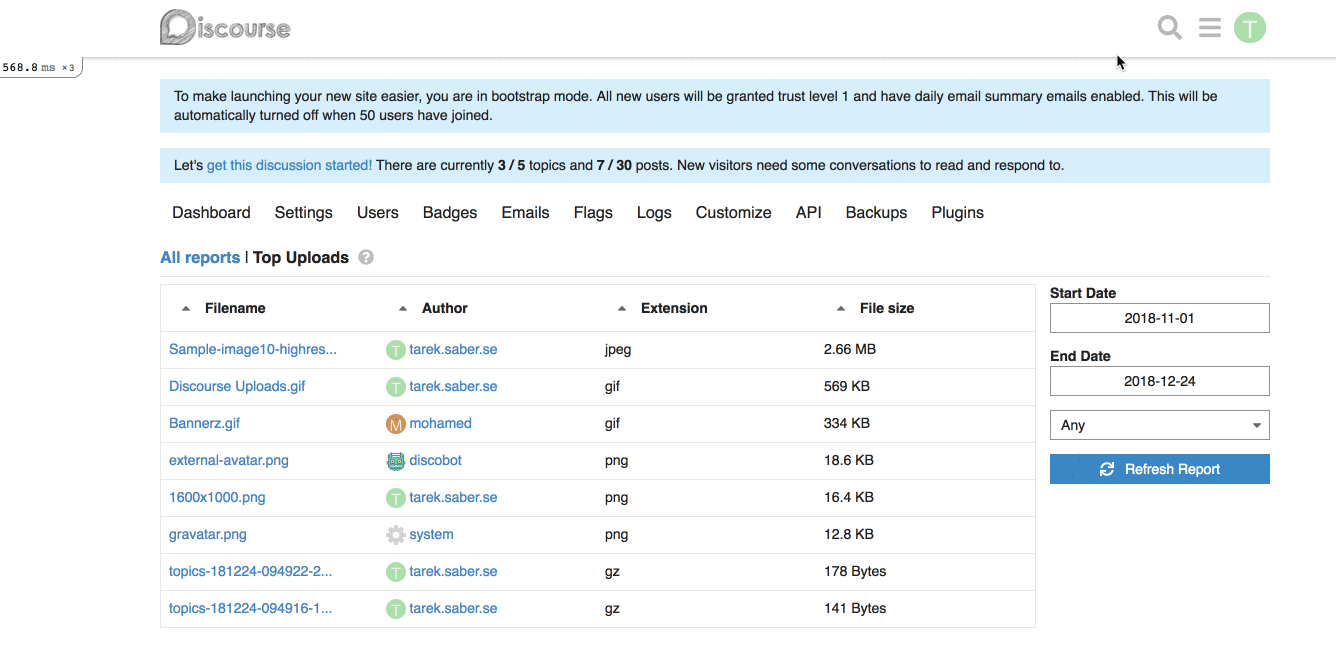This test did not support 'no auth' use case and other auth methods except 'login'. I fixed it by simply making the call to start() in the right way.
As shown in the source code of Net::SMTP (https://github.com/ruby/ruby/blob/ruby_2_5/lib/net/smtp.rb#L452), the start() function does accept the 'user' and 'secret' arguments. Also, in do_start() function (https://github.com/ruby/ruby/blob/ruby_2_5/lib/net/smtp.rb#L542), it automatically checks the auth method and args, skips the authentication if 'user' is not provided, and selects the right auth method from 'plain', 'login' or 'cram_md5'. This is exactly all of what we should do in a connection test and the odd 'auth_login' call in the previous code makes problems.
BTW, I am using 'localhost' as the third argument, which is the same as the default value in start(). This parameter is the domain address sent along with the 'ehlo' command in SMTP protocol. I have seen some documents, e.g. https://github.com/tpn/msmtp/blob/master/doc/msmtp.1#L455, saying that 'localhost' is fine. It works for me.
* FEATURE: Exposing a way to add a generic report filter
## Why do we need this change?
Part of the work discussed [here](https://meta.discourse.org/t/gain-understanding-of-file-uploads-usage/104994), and implemented a first spike [here](https://github.com/discourse/discourse/pull/6809), I am trying to expose a single generic filter selector per report.
## How does this work?
We basically expose a simple, single generic filter that is computed and displayed based on backend values passed into the report.
This would be a simple contract between the frontend and the backend.
**Backend changes:** we simply need to return a list of dropdown / select options, and enable the report's newly introduced `custom_filtering` property.
For example, for our [Top Uploads](https://github.com/discourse/discourse/pull/6809/files#diff-3f97cbb8726f3310e0b0c386dbe89e22R1423) report, it can look like this on the backend:
```ruby
report.custom_filtering = true
report.custom_filter_options = [{ id: "any", name: "Any" }, { id: "jpg", name: "JPEG" } ]
```
In our javascript report HTTP call, it will look like:
```js
{
"custom_filtering": true,
"custom_filter_options": [
{
"id": "any",
"name": "Any"
},
{
"id": "jpg",
"name": "JPG"
}
]
}
```
**Frontend changes:** We introduced a generic `filter` param and a `combo-box` which hooks up into the existing framework for fetching a report.
This works alright, with the limitation of being a single custom filter per report. If we wanted to add, for an instance a `filesize filter`, this will not work for us. _I went through with this approach because it is hard to predict and build abstractions for requirements or problems we don't have yet, or might not have._
## How does it look like?

## More on the bigger picture
The major concern here I have is the solution I introduced might serve the `think small` version of the reporting work, but I don't think it serves the `think big`, I will try to shed some light into why.
Within the current design, It is hard to maintain QueryParams for dynamically generated params (based on the idea of introducing more than one custom filter per report).
To allow ourselves to have more than one generic filter, we will need to:
a. Use the Route's model to retrieve the report's payload (we are now dependent on changes of the QueryParams via computed properties)
b. After retrieving the payload, we can use the `setupController` to define our dynamic QueryParams based on the custom filters definitions we received from the backend
c. Load a custom filter specific Ember component based on the definitions we received from the backend
* First take
* Add support for sprites in themes
Automatically register any custom icons added via themes or plugins
* Fix theme sprite caching
* Simplify test
* Update lib/svg_sprite/svg_sprite.rb
Co-Authored-By: pmusaraj <pmusaraj@gmail.com>
* Fix /svg-sprite/search request
For some reason, setting a text site setting to empty in the past can
result in either an empty string or null as the value. This migration
is a follow up to 1981add261.
If the depercated SiteSetting.logo_url was set to "" previously, it will
not have been migrated by the onceoff job which we added. As such, we
need a migration to migrate the blank override so that the default for
certain upload site settings will not be used.
The library used to generate random text changed, this caused the title
of the topic used for testing to change, which meant the slug changed, so
a hit to the topic was a redirect
This fix gives the topic used for performance testing a static name to avoid
this issue in future
* FEATURE: Add `IgnoredUsersSummary` daily job
## Why?
This is part of the [Ability to ignore a user feature](https://meta.discourse.org/t/ability-to-ignore-a-user/110254/8).
We want to:
1. Send an automatic group PM that goes out to moderators
2. When {x} users have Ignored the same user, threshold defined by a site setting, default of 5
3. Only send this message every X days which is defined by another site setting
It is not a setting, and only relevant in specs. The new API is:
```
Jobs.run_later! # jobs will be thrown on the queue
Jobs.run_immediately! # jobs will run right away, avoid the queue
```
If the existing email address for a user ends in `.invalid`, we should take the email address from an authentication payload, and replace the invalid address. This typically happens when we import users from a system without email addresses.
This commit also adds some extensibility so that plugin authenticators can define `always_update_user_email?`
Since uploads site settings are now backed by an actual upload, we don't
have to reach over the network just to fetch the favicon. Instead, we
can just read the upload directly from disk.